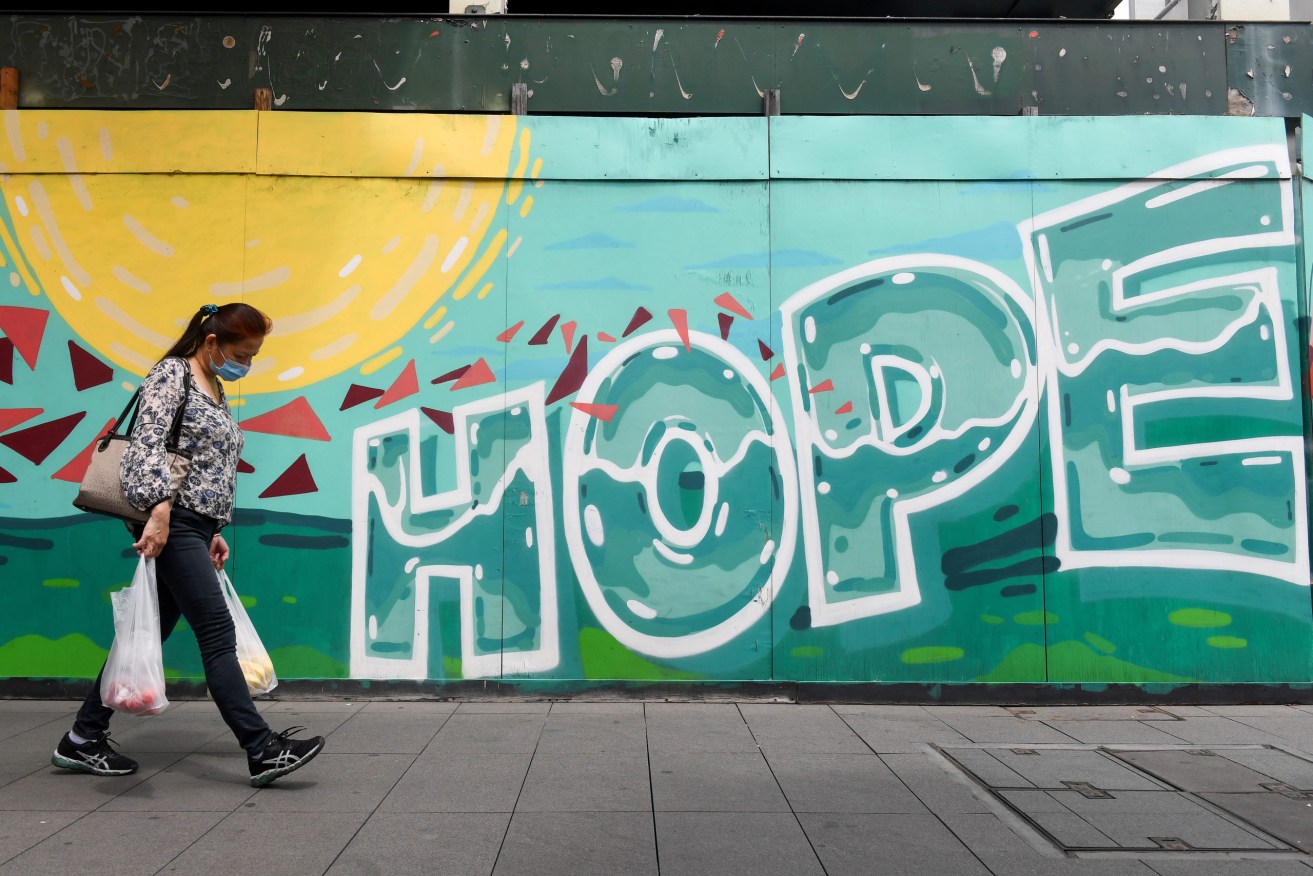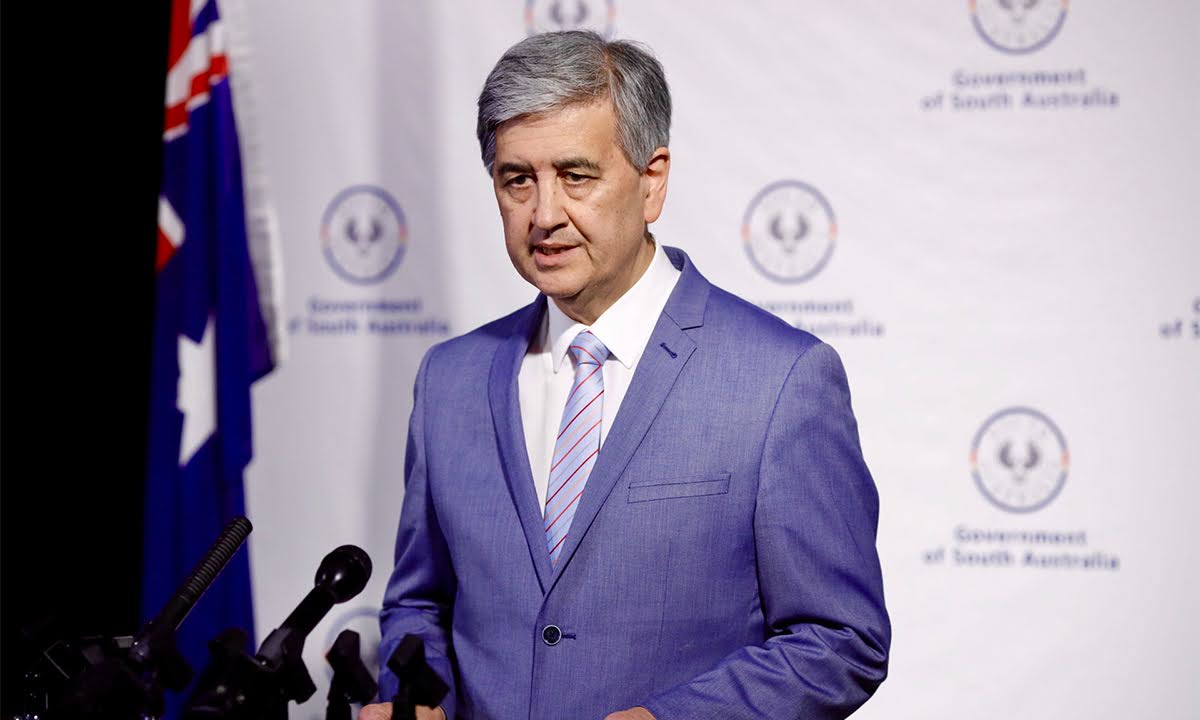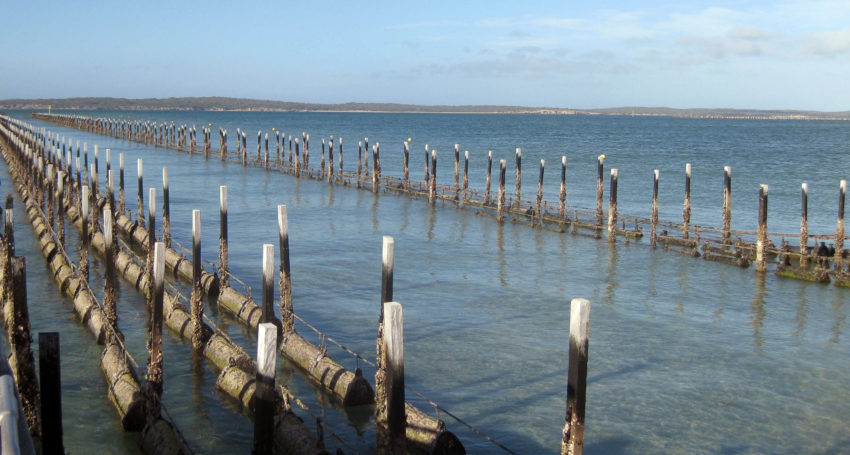What we know today, Wednesday December 15
More than 700 people have been forced into isolation after a COVID-positive case visited two Melbourne nightclubs, while infections have surged in NSW as the state today ends capacity limits and restrictions against the unvaccinated.

Photo: AAP/Bianca De Marchi
- Case surge in NSW as state ends restrictions for unvaccinated
- New exposure sites after SA records 12 new COVID cases
- SANFL announces player, staff vaccine mandate
- Almost 80,000 SA public servants impacted by cyber attack
- Coffin Bay oyster restrictions lift in time for Christmas
- Tasmania reopens to mainland Australia
- International students, skilled workers allowed into Australia
Case surge in NSW as state ends restrictions for unvaccinated
COVID-19 infections have surged in NSW as the state today ends capacity limits and restrictions against the unvaccinated.
Some 1360 new cases were recorded yesterday – a jump of 556 on the 804 recorded the previous day.
It is the first time in months the state has recorded more than a thousand new cases in a single day, and comes as the unvaccinated enjoy renewed freedoms to shop and socialise.
From Wednesday, unvaccinated people in NSW are subject to the same restrictions as those who have been fully vaccinated against COVID, for the first time in three months.
The NSW government has also honoured its pledge to significantly ease restrictions despite a sharp rise in case numbers amid super-spreading events in the festive season.
QR code check-ins will be scaled back and masks are only required in high-risk settings like public transport and planes.
There is no cap on visitors in homes, hospitality venues, or on numbers at outdoor gatherings.
Meanwhile, NSW Health says fully vaccinated arrivals from eight southern African countries of concern where the Omicron variant of COVID-19 emerged will no longer have to enter 14 days hotel quarantine, bringing all international arrivals under the same measures.
All fully vaccinated international arrivals must self-isolate for 72 hours, have a negative result within the first 24 hours of arrival and avoid high-risk settings for a week.
The latest easing of restrictions – long-planned for December 15 – comes just as case numbers spike to a two-month high.
Infection numbers have more than quadrupled in the past two weeks.
In Victoria, another 1405 COVID-19 cases and a further three deaths were reported, with more than 700 people forced into isolation after an Omicron-infected patron visited two Melbourne nightspots.
The state was now managing 10,781 active cases, the health department confirmed on Wednesday.
There are 365 patients in hospital, 84 of whom are actively infected with the virus in intensive care and 46 on ventilators
New exposure sites after SA records 12 new COVID cases
City bars, a coffee shop and a gym are among a number of new exposure sites announced by SA Health overnight, after South Australia reported 12 new cases of COVID-19, including two health care workers who visited multiple Adelaide aged care facilities.
In a statement yesterday afternoon, SA Health said it was contacting the aged care facilities that were visited by the infected health care workers and asking them to enforce additional infection control measures while residents and staff got tested.
Under current directions, all health care workers must be fully-vaccinated.
SA Health has not confirmed which aged care facilities were visited by the medicos or for how long they might be placed into lockdown, with a spokesperson declining to provide further information.
The health care workers were among 12 new COVID-19 cases reported in South Australia yesterday, including four women and four men aged between 20 and 60, and four children under the age of 12.
“Of these cases, one acquired their infection interstate, five acquired their infection locally and are known contacts of a positive case, and six acquired their infection in Australia and investigations into the source of their infection is still ongoing,” SA Health said in a statement.
Two men in their 30s and 60s are currently in the Royal Adelaide Hospital in a stable condition.
Of the 12 cases reported today, four are vaccinated and three are unvaccinated, while the vaccination status of the remaining five is unknown.
There are currently 70 active COVID-19 cases in the state and 651 close contacts who are in quarantine.
SA Health last night added several new exposure sites to its growing list, including several popular city bars, a cafe, gym, police station and cricket club.
Some of the exposure sites date back more than a week.
People who visited the following close contact exposure sites must immediately quarantine and get tested:
- Adelaide – Atlantis Lounge Bar on Saturday December 4 from 10pm to Sunday December 5 at 12.45am
- Adelaide – Elementary Coffee on Wednesday December 8 from 9.30am to 10.30am
- Adelaide – Plain Jane Bar on Sunday December 5 from 2.30am to 3am
- Adelaide – The Meat & Wine Co on Tuesday December 7 from 4.15pm to 10.45pm, Wednesday December 8 from 11.45am to 4.30pm and 5pm to midnight, Thursday December 9 from 12pm to 3pm, and Friday December 10 from 1.15pm to 9.45pm
- Adelaide – Zhivago on Sunday December 5 from 12.30am to 2.45am
- Glenside – Dumpling Lab on Thursday December 9 from 6pm to 6.30pm
- Holden Hill – Holden Hill Police Station (front waiting area) on Saturday December 12 from 11.15am to 12.25pm
- Norwood – Derrimut 24:7 Gym on Monday December 6 from 7pm to 8.30pm, Tuesday December 7 from 7pm to 8.30pm, and Thursday December 9 from 6pm to 8.30pm
- Port Adelaide – Port Adelaide Cricket Club (indoors) on Wednesday December 8 from 5.15pm to 7.45pm, and Thursday December 9 from 5.50pm to 8.45pm
Several casual contact and low risk casual contact sites, including Adelaide Zoo, a public pool and a supermarket, have also been added to SA Health’s updated list.
Meanwhile, SA Health is yet to detect a positive case of COVID-19 in the APY Lands, after the virus was twice detected in wastewater in the remote Far North region.
All 239 #COVID19 tests from Indulkana in the APY Lands have been returned as negative.
The tests follow the detection by @SAHealth of fragments of the virus in wastewater in the @APY_Lands last week.
Read more: https://t.co/DflV358GMY pic.twitter.com/KPjozccvwT
— APY Lands (@APY_Lands) December 14, 2021
In a statement yesterday, the APY Lands executive board said all 239 Indulkana residents aged over five had returned negative test results.
Approximately 150 people from Pipalyatjara are also being encouraged get tested over the coming days.
To stop residents from moving throughout the lands and potentially spreading the virus, a temporary fuel cap of 20 litres and a restriction on withdrawing cash from ATMs has been imposed.
The APY Lands executive board has also asked residents to limit visitors to their home and to only send one adult per household to shop.
It said it would keep the measures in place “for the next couple of weeks” to give SA Health time to retest the wastewater and to investigate the potential source of infection.
It comes as authorities continue to discuss which restrictions to lift once South Australia reaches its 90 per cent vaccination target for those aged over 12.
Police Commissioner and state emergency coordinator Grant Stevens told reporters yesterday that authorities would “be able to give pretty clear detail on that plan” by Friday.
He also flagged that there would likely be different restrictions in place for venues that do not have vaccination policies.
Premier Steven Marshall said the government would give operators “the choice to be a vaccinated venue or an unvaccinated venue”.
“There will be a differential between those two in terms of the restrictions,” he said.
Latest SA Health data shows 84.5 per cent of South Australians aged over 12 are fully-vaccinated, while 91.2 per cent have received one dose of a vaccine.
SANFL announces player, staff vaccine mandate
SANFL players and staff across all state league competitions will need to be fully vaccinated against COVID-19 by late January or they will be barred from playing or training.
The South Australian Football Commission yesterday agreed to impose a vaccine mandate on all players, support staff and volunteers across its multiple league and reserves competitions.
The mandate will come into force on January 28 ahead of the SANFL women’s league season starting on February 4.
Players and staff will also be required to receive a booster shot within the recommended timeframe.
Those who do not comply would be banned from attending club premises to train or play, unless they have an approved medical exemption.
SANFL CEO Darren Chandler said a recent survey conducted by all SANFL clubs showed that by the end of the year, 87 per cent of players, coaches, officials, umpires and staff would be fully-vaccinated.
“We’ve been taking a strong stance on vaccination and this policy now delivers on our commitment to protect players, staff, volunteers and the broader community,” he said.
“Our priority is to create the safest environment possible for our players, staff and volunteers while also doing everything we possibly can to keep all South Australians safe and minimise any risk of COVID-19 transmission.’’
SANFL umpires, as employees of SANFL, need to be fully vaccinated by January 10 to comply with SANFL’s workforce vaccination policy.
The policy does not cover community football, which includes all affiliated leagues and SANFL juniors.
Under the AFL’s vaccine policy, announced in October, players and football staff at SA-based clubs must be fully-vaccinated by February 18 to participate in the 2022 pre-season.
Almost 80,000 SA public servants impacted by cyber attack

Treasurer Rob Lucas. Photo: Tony Lewis/InDaily
The number of South Australian government workers whose names, addresses, tax file numbers and banking details were stolen in a massive ransomeware cyber attack has increased to nearly 80,000, Treasurer Rob Lucas has confirmed.
Lucas revealed the breach on Friday, confirming private and financial records of at least 38,000 employees had been accessed – with more than twice as many potentially impacted.
A government analysis of Frontier Software files has since confirmed that personal information belonging to nearly 80,000 employees was stolen.
Lucas said all public sector employees except those employed by the Department for Education should assume that their personal information was accessed during the data breach.
“On behalf of the government, I once again apologise to those employees affected and will ensure they continue to be kept informed as our investigation with Frontier Software continues,” he said.
Data accessed by hackers contained first and last names, birth date, home address, tax file number, bank account, payment and superannuation details.
The State Government is currently working with the Australian Taxation Office to add additional security measures to all affected tax file numbers.
It has also asked banks and SuperSA – the public sector employee superannuation scheme – to add additional safeguards for employees’ accounts.
The SA Privacy Committee, Office of the Australian Information Commissioner and the Australian Federal Police have been informed of the data breach.
It comes after InDaily reported on Monday that the Public Service Association was seeking legal advice over the breach on behalf of its members, demanding the government cover the costs of any employees affected.
But Lucas said to date there was no evidence of anyone’s accounts being accessed.
Labor’s shadow Treasurer Stephen Mullighan said the cyber attack was a “very concerning situation” for public servants who usually go out of their way to keep their personal information confidential.
“This information has now been stolen and the Marshall Liberal Government needs to explain what steps it is taking to protect these public servants,” he said.
Coffin Bay oyster restrictions lift in time for Christmas

A Coffin Bay oyster farm. Photo: AAP/Liza Kappelle
Oyster farmers in Coffin Bay will be allowed to progressively open back up for harvesting from this week, after a spike in gastro cases prompted a product recall and farm closures across the region.
The State Government is urging South Australians to purchase the Coffin Bay delicacies this Christmas, with the first oysters able to reach customers this week after an industry-wide shutdown and product recall.
The restrictions were enforced in November in response to reports of consumers becoming ill with Vibrio parahaemolyticus (VP), which can cause gastro, nausea, vomiting and fever.
Growers told InDaily the product recall cost was likely to cost the industry millions of dollars and could result in some producers being forced to close their business.
Primary Industries and Regional Development Minister David Basham said the State Government had worked closely with the oyster industry to lift the restrictions as soon as possible.
“We are confident Coffin Bay oyster growers have done everything possible to give confidence to consumers about the safety of their product and we can start seeing South Australia’s famous oysters back on family dining tables in time for Christmas,” he said.
“The State Government has been working closely with the 32 accredited growers in the Coffin Bay area to ensure enhanced control measures in place to protect consumers.”
Basham said growers had implemented procedures to rapidly reduce the temperature of oysters after harvest to reduce the likelihood of the Vibrio bacteria.
He said an ongoing surveillance program had also been put in place with regular oyster testing.
A government investigation into the cause of the outbreak of Vp was unable to conclusively determine what had caused the spike in Vp cases, however it suspected that high temperatures post-harvest might have contributed.
Tasmania reopens to mainland Australia
Tasmania is opening its borders to all fully-vaccinated travellers from today after closures spanned the best part of two years.
The island state is bracing for an influx of tourists and inevitable COVID-19 cases as it reopens to mainland states and territories.
“This has been a very difficult 22 months. We have made some really difficult decisions,” Tasmanian Premier Peter Gutwein told reporters on Tuesday.
“We’ve had to stop people entering to attend a funeral, to bury a loved one. We’ve stopped weddings.”
Under the reopening plan, people coming from designated high-risk areas must return a negative test in the 72 hours before they arrive and present proof at the border.
Tasmania has been largely spared the internal restrictions implemented across Australia and has been essentially free of virus cases in the community since a deadly outbreak early last year.
Since the start of the pandemic, the state has reported 238 COVID-19 cases and 13 deaths.
The Tasmanian Government released border-reopening modelling a few months ago which predicts 87 deaths in the six months from December and 50,000 cases.
The state’s health department said the system is prepared although several unions have raised concerns about staff levels.
International students, skilled workers allowed into Australia
Visa holders including international students and skilled workers are now allowed to enter the country, almost two years since Australia’s international borders closed due to the pandemic.
The decision will from today allow skilled workers and international students to come into Australia without needing a travel exemption.
It comes after the federal government placed a two-week pause on visa holders being able to return over concern about the arrival of the COVID-19 Omicron variant.
Despite Omicron leading to spikes in case numbers in several states, the pause will end on schedule.
The resumption means a travel bubble with Japan and South Korea can also begin.
The government estimates about 235,000 visa holders would be eligible to enter the country, including an estimated 133,000 international students.
Universities Australia chief executive Catriona Jackson said she was delighted international students could at last return.
“We have missed their presence dearly and couldn’t be more delighted to welcome them back from today,” she said.
“We recognise the very real effects COVID-19 has had on their wellbeing, and the resilience they have shown amidst extreme uncertainty.”
-With AAP and Reuters




